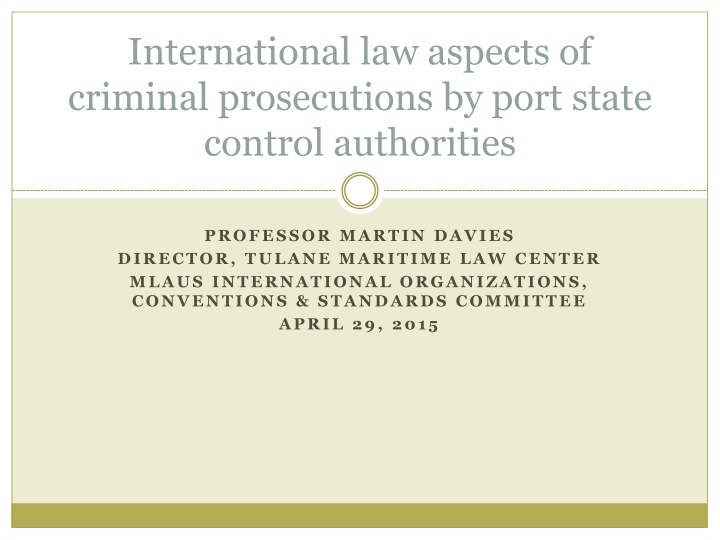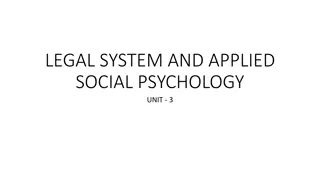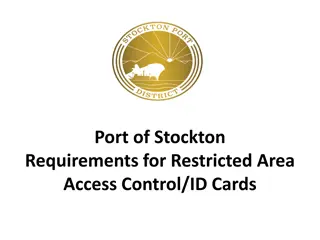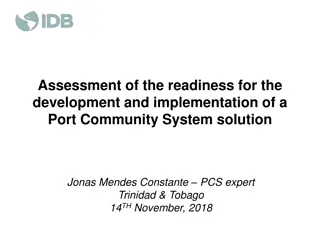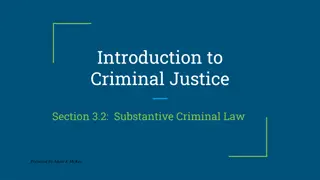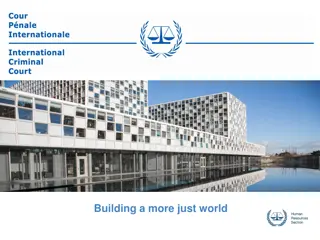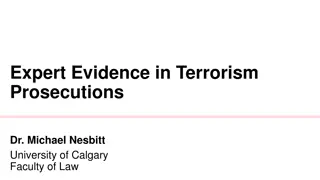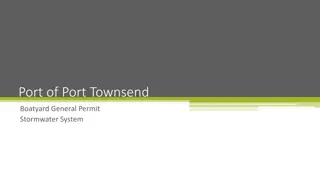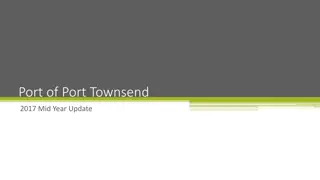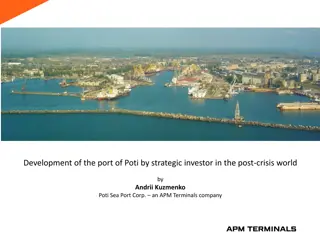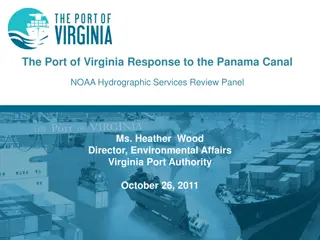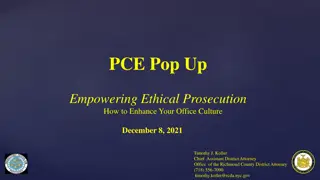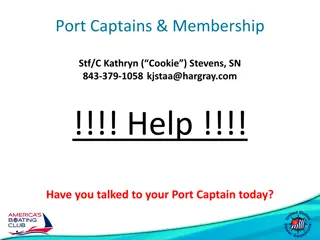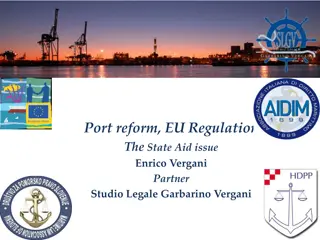International Law Aspects of Criminal Prosecutions by Port State Control Authorities
Explore the intricate legal framework surrounding criminal prosecutions conducted by port state control authorities, focusing on key cases, concepts of jurisdiction, and the impact of international maritime conventions. Delve into the historical significance of cases like The Lotus Case and understand the complexities of penal jurisdiction in matters of collision and navigation.
Download Presentation

Please find below an Image/Link to download the presentation.
The content on the website is provided AS IS for your information and personal use only. It may not be sold, licensed, or shared on other websites without obtaining consent from the author.If you encounter any issues during the download, it is possible that the publisher has removed the file from their server.
You are allowed to download the files provided on this website for personal or commercial use, subject to the condition that they are used lawfully. All files are the property of their respective owners.
The content on the website is provided AS IS for your information and personal use only. It may not be sold, licensed, or shared on other websites without obtaining consent from the author.
E N D
Presentation Transcript
International law aspects of criminal prosecutions by port state control authorities PROFESSOR MARTIN DAVIES DIRECTOR, TULANE MARITIME LAW CENTER MLAUS INTERNATIONAL ORGANIZATIONS, CONVENTIONS & STANDARDS COMMITTEE APRIL 29, 2015
Outline 2 Background Customary international law and the Lotus case UNCLOS as the source of port state jurisdiction Sellers v. Maritime Safety Inspector (New Zealand) Air Transport Association of America v. Secretary of State for Energy and Climate Change (European Court of Justice) Implications for magic pipe cases
Public international law 3 Deep-rooted concept of freedom of navigation Regulation to be principally by flag states Limited right of port states to interfere and apply their criminal law to activities on foreign-flagged ships Matters of internal economy to be determined by flag state Coastal state concerned only with matters of external consequence Mali v. Keeper of the Common Jail (Wildenhus Case), 120 US 1 (1887) (no habeas corpus for Belgian sailor jailed in New Jersey for stabbing a shipmate on board the ship)
The Lotus Case (France v Turkey) (1927) 4 Collision on the high seas between a French ship and a Turkish ship Turkish ship sank, eight Turkish sailors drowned Survivors taken to Turkey on the French ship French officer of the watch (Demons) and Turkish captain charged with manslaughter Demons convicted and jailed French government protested demanding release of Demons Turkey and France agreed to refer the case to the Permanent Court of International Justice (PCIJ)
PCIJ in The Lotus 5 Turkey did not violate customary international law by prosecuting Demons France and Turkey had concurrent jurisdiction over a collision between ships carrying their respective flags Thus, Turkey s jurisdiction to prosecute rested on its role as flag state, not as the coastal state where Demons was brought Turkey could prosecute conduct having an effect on a Turkish ship Decision reversed by International Convention for the Unification of Certain Rules relating to Penal Jurisdiction in Matters of Collision and Other Incidents of Navigation 1952, the Geneva Convention on the High Seas 1958 and UNCLOS Art 97 Penal jurisdiction re a collision is not concurrent Criminal responsibility of a person for a collision on the high seas is solely dependent on the law of the flag of the ship on which that person was at the time of the collision
UNCLOS and port state control 6 UNCLOS provisions about port state control are specifically related to pollution Article 218(1) enables a port state to investigate and prosecute a pollution discharge outside the territorial sea or EEZ in violation of applicable international rules and standards Article 218(3) requires a flag state to comply with port state requests for investigation as far as practicable Article 219: if a port state ascertains that a vessel is in violation of international rules and standards relating to unseaworthiness of vessels and thereby threatens damage to the marine environment shall take administrative measures to prevent the ship from sailing except to the nearest appropriate repair yard Art 220 authorizes coastal state to take action in respect of any violation of its laws and regulations adopted in accordance with applicable international rules and standards in relation to pollution when the violation is within its territorial sea or EEZ
Sellers (The Nimbus) 7 Sellers v. Maritime Safety Inspector (The Nimbus) [1999] 2 NZLR 44 Owner/master of Maltese-registered cutter Nimbus charged with leaving port without radio and emergency location beacon equipment required under NZ law Convicted, appeal dismissed by High Court, appealed again to Court of Appeal, relying on the doctrine of the freedom of the seas Prosecution relied on The Lotus: a coastal state can prosecute behavior having an effect in the coastal state or on ships carrying the flag of that state
Sellers (The Nimbus) 8 NZ Court of Appeal quashed the conviction Exclusive jurisdiction of flag state an essential feature of the freedom of the high seas and the freedom of navigation Prosecution argued that this legislation (and prosecution) was about conduct in New Zealand waters, at point of departure from New Zealand port CA said that in reality, it was an attempt to regulate conduct on the high seas NZ Maritime Safety Authority had search and rescue responsibilities in broad area of South Pacific
Air Transport Association (ECJ) 9 Air Transport Association of America v. Secretary of State for Energy and Climate Change, Case C- 366/10, [2012] 2 CMLR 4 UK legislation to implement EU Directive 2008/101 restricting greenhouse gas emissions from aircraft arriving or departing at EU airports Challenged on the basis that this was a denial of the right of free overflight of the high seas, which is guaranteed by UNCLOS Art 87(1)(b) Referred to ECJ by High Court of England and Wales Applicant relied on Sellers: regulation of emissions by the coastal states of the EU was a restriction of the right of free use of the (airspace over) the high seas
Air Transport Association (ECJ) 10 ECJ distinguished Sellers, held that the (UK legislation implementing) the Directive did apply to foreign aircraft Directive was a legitimate regulation of activity occurring within the territory of the coastal state(s) because of its effect in that territory i.e., the very argument that failed in Sellers
Significance for magic pipe cases 11 UNCLOS plainly authorizes investigation in relation to possible pollution within territorial waters or beyond, and possibly prosecution ( although the US is still not party to UNCLOS) Magic pipe as evidence of its use to make illegal discharges Prosecutions in relation to activity not directly related to possible pollution not so clearly authorized by international law Concealing information or giving misleading information is a purely domestic matter unrelated to freedom of navigation of the high seas
